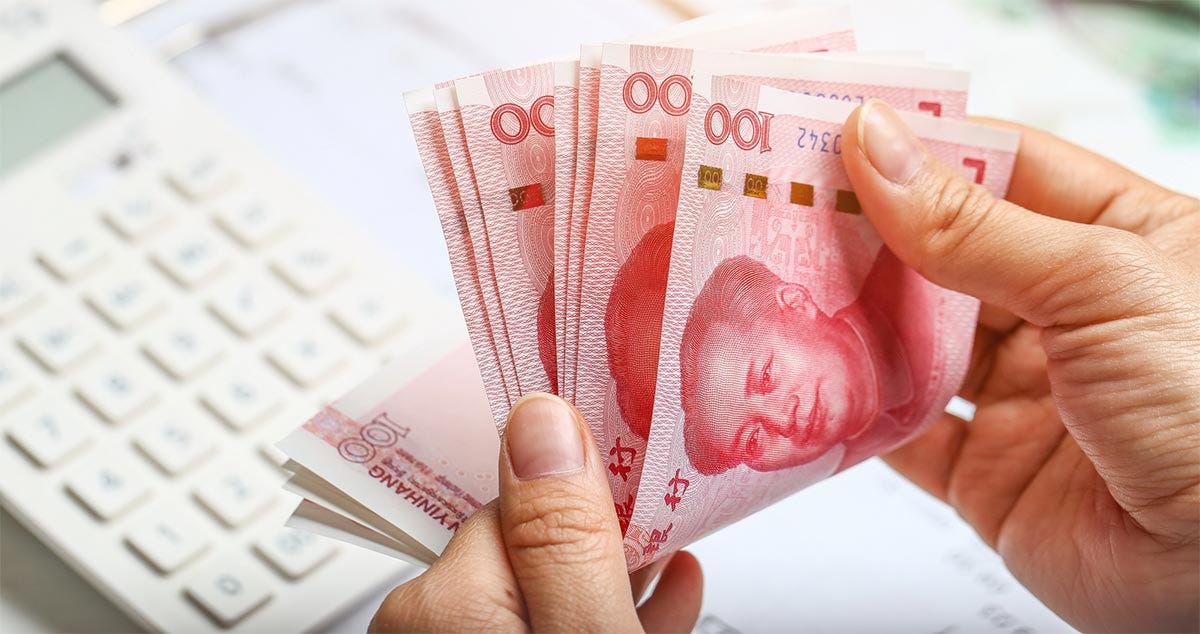What is money called in China?
Money in Chinese is called 钱 (qián). However, this is the broadest term used to refer to money, and there are several nuances you need to be aware of. In China, the official currency is called 人民币 (rén mín bì), but most people simply call it 元 (yuán) in everyday conversation. There are also colloquial words for different denominations, as well as specific ways to refer to large amounts of money and foreign currencies. Let’s take a closer look:

钱 — qián
This is the general term for money in Chinese. It’s used in everyday conversation to refer to money in any form, including coins, bills, or digital funds.
For example, when asking someone how much something costs, you might say, “这个多少钱?” (zhè ge duō shǎo qián?), which directly translates to “How much does this cost?”
The word 钱 is also commonly used when discussing wealth, savings, and financial transactions. Phrases like 赚钱 (zhuàn qián) “to make money” and 花钱 (huā qián) “to spend money” are used all the time, but more on that in our vocabulary section below!
Example sentences using 钱
| English |
Chinese |
Pinyin |
Pronunciation |
| I don’t have money. |
我没有钱。 |
wǒ méi yǒu qián. |
woo mei yeou chyan. |
| How much is this? |
这个多少钱? |
zhè ge duō shǎo qián? |
jeh ge duo shao chyan? |
| Can you lend me a little money? |
你可以借我一点钱吗? |
nǐ kě yǐ jiè wǒ yì diǎn qián ma? |
nii kee yii jieh woo yih dean chyan mha? |
元 — yuán
Now we’re getting more formal. The character 元 refers to the official currency unit in China, equivalent to the dollar in the United States. It’s used in formal and written contexts, especially in financial transactions, contracts, and official documents.
For example, a letter of a scholarship award might read “10000元” to indicate that the student has earned ¥10,000 or 10,000 CNY (Chinese Yuan). Remember, you’ll want to place the 元 character after the number in Chinese. The character 元 is also used in banking and finance, appearing in account statements, receipts, and other monetary documents. In formal business settings, 元 is preferred to the colloquial 块.
Example sentences using 元
| English |
Chinese |
Pinyin |
Pronunciation |
| This book costs ten yuan. |
这本书十元。 |
zhè běn shū shí yuán. |
jeh been shu shyr yuan. |
| I have fifty yuan. |
我有五十元。 |
wǒ yǒu wǔ shí yuán. |
woo yeou wuu shyr yuan. |
| My bank account has five thousand yuan. |
我的银行账户有五千元。 |
wǒ de yín háng zhàng hù yǒu wǔ qiān yuán. |
woo de yn harng janq huh yeou wuu chian yuan. |
块 — kuài
This is the colloquial term, and probably the one you’ll hear most often in your everyday life. It’s somewhat like saying “buck” in English, but perhaps a bit less informal. For example, someone might say “这本书二十块” meaning that the book costs 20 yuan.
You’ll use this word mostly in verbal speech in everyday conversations, such as shopping, dining, and casual conversations about money. It’s less formal than 元 and typically used among friends, family, and in informal settings. Despite its casual nature, you’ll find that 块 is universally understood and used, making it one of the most important words for anyone trying to learn Chinese.
Example sentences using 块
| English |
Chinese |
Pinyin |
Pronunciation |
| This cup of coffee costs twenty kuai. |
这杯咖啡二十块。 |
zhè bēi kā fēi èr shí kuài. |
jeh bei ka fei ell shyr kuay. |
| I only have ten kuai. |
我只有十块钱。 |
wǒ zhǐ yǒu shí kuài qián. |
woo jyy yeou shyr kuay chyan. |
| Can you lend me five kuai? |
你能借我五块吗? |
nǐ néng jiè wǒ wǔ kuài ma? |
nii neng jieh woo wuu kuay mha? |
¥ — CNY
In the international context, the official currency of China: renminbi (RMB), meaning People's Currency, is represented by the sign ¥. This is the official currency sign for CNY, just like the dollar sign $ for the United States dollar or the € sign for the euro. While RMB refers to the currency itself, CNY denotes the specific unit of that currency, the yuan. Oftentimes, you might see RMB and CNY used interchangeably.
Example sentences using ¥
| English |
Chinese |
Pinyin |
Pronunciation |
| The price of this phone is ¥5000. |
这部手机的价格是¥5000。 |
zhè bù shǒu jī de jià gé shì ¥5000. |
jeh buh shoou ji de jiah ger shyh ¥5000. |
| I spent ¥100. |
我今天花了¥100。 |
wǒ jīn tiān huā le ¥100. |
woo jin tian hua lhe ¥100. |
| She gave me ¥50 as a gift. |
她给了我¥50作为礼物。 |
tā gěi le wǒ ¥50 zuò wéi lǐ wù. |
ta geei lhe woo ¥50 tzuoh wei lii wuh. |
角 — jiǎo
This character refers to jiao, a unit of currency that is one-tenth of a yuan. This character is used in more formal and written contexts. It appears on banknotes, coins, and official financial documents. For example, a price might be written as 1.5 元 and could also be expressed as 一元五角 to denote one yuan and five jiao.
Example sentences using 角
| English |
Chinese |
Pinyin |
Pronunciation |
| One yuan equals ten jiao. |
一元等于十角。 |
yì yuán děng yú shí jiǎo. |
yih yuan deeng yu shyr jeau. |
| The price of this notebook is three yuan five jiao. |
这本笔记本的价格是三元五角。 |
zhè běn bǐ jì běn de jià gé shì sān yuán wǔ jiǎo. |
jeh been bii jih been de jiah ger shyh san yuan wuu jeau. |
| He gave me one jiao as the change. |
他找给我一角钱。 |
tā zhǎo gěi wǒ yì jiǎo qián. |
ta jao geei woo yih jeau chyan. |
毛 — máo
This is the colloquial term for the 角, which is one-tenth of a yuan. It’s widely used in everyday language to refer to small amounts of money. For example, if an item costs 0.50 yuan, you would say it costs 五毛, or five mao. The term 毛 is particularly useful in informal settings like markets, and small shops, and when discussing minor expenses with friends and family.
Example sentences using 毛
| English |
Chinese |
Pinyin |
Pronunciation |
| This candy costs five mao. |
这颗糖五毛。 |
zhè kē táng wǔ máo. |
jeh ke tarng wuu mau. |
| I only need a few mao. |
我只需要几毛钱。 |
wǒ zhǐ xū yào jǐ máo qián. |
woo jyy shiu yaw jii mau chyan. |
| Do you have one mao? |
你有一毛吗? |
nǐ yǒu yì máo ma? |
nii yeou yih mau mha? |
分 — fēn
This is the smallest unit of Chinese currency, equivalent to one-hundredth of a yuan. It’s used for very small amounts of money, often in pricing for items with precise costs like utilities or wholesale goods.
For example, an item priced 0.08 元 would be referred to as 八分. Although rarely used, this character is helpful in situations where expressing exact prices is important so transactions can be accurate to the last decimal. It appears on some older coins, although they’re rarely in use now.
Example sentences using 分
| English |
Chinese |
Pinyin |
Pronunciation |
| The pencil costs seven jiao eight fen. |
这支铅笔七角八分。 |
zhè zhī qiān bǐ qī jiǎo bā fēn. |
jeh jy chian bii chi jeau ba fen. |
| I only have five fen. |
我只有五分。 |
wǒ zhǐ yǒu wǔ fēn. |
woo jyy yeou wuu fen. |
| Can you give me one fen? |
你能给我一分吗? |
nǐ néng gěi wǒ yì fēn ma? |
nii neng geei woo yih fen mha? |
Most important Chinese words about money
Now that you’re familiar with the basic units of money in Chinese, it’s time to review some vocabulary words. Here are the 20 most important words about money in Chinese. You’ll find essential vocabulary words and phrases, as well as a few adjectives in Chinese to describe the value of things.
| English |
Chinese |
Pinyin |
Pronunciation |
| Currency |
货币 |
huò bì |
huoh bih |
| Paper money |
纸币 |
zhǐ bì |
jyy bih |
| Coin |
硬币 |
yìng bì |
yinq bih |
| Cash |
现金 |
xiàn jīn |
shiann jin |
| Small change |
零钱 |
líng qián |
ling chyan |
| How much money |
多少钱 |
duō shǎo qián |
duo shao chyan |
| Expensive |
贵 |
guì |
guey |
| Cheap |
便宜 |
pián yi |
pyan i |
| Discount |
折扣 |
zhé kòu |
jer kow |
| Price |
价格 |
jià gé |
jiah ger |
| To spend money |
花钱 |
huā qián |
hua chyan |
| To give money |
给钱 |
gěi qián |
geei chyan |
| To give change |
找钱 |
zhǎo qián |
jao chyan |
| To pay in cash |
付现金 |
fù xiàn jīn |
fuh shiann jin |
| How much money do I need to pay? |
我需要支付多少钱? |
wǒ xū yào zhī fù duō shǎo qián? |
woo shiu yaw jy fuh duo shao chyan? |
| To save money |
省钱 |
shěng qián |
sheeng chyan |
| Receipt |
收据 |
shōu jù |
shou jiuh |
| Wallet |
钱包 |
qián bāo |
chyan bau |
Example conversations about money
| Person |
English |
Chinese |
Pinyin |
Pronunciation |
| A: |
Do you have money? |
你有钱吗? |
nǐ yǒu qián ma? |
nii yeou chyan mha? |
| B: |
A little. How much do you need? |
有一点。你需要多少? |
yǒu yì diǎn. nǐ xū yào duō shǎo? |
yeou yih dean. nii shiu yaw duo shao? |
| A: |
I need fifty kuai. |
我需要五十块。 |
wǒ xū yào wǔ shí kuài. |
woo shiu yaw wuu shyr kuay. |
| B: |
Okay, here you go. |
好的,这个给你。 |
hǎo de, zhè ge gěi nǐ. |
hao de, jeh ge geei nii. |
| A: |
Thank you. |
谢谢你。 |
xiè xie nǐ. |
shieh shie nii. |
| B: |
You’re welcome. |
不客气。 |
bú kè qì. |
bwu keh chih. |
| Person |
English |
Chinese |
Pinyin |
Pronunciation |
| A: |
Can I ask how much this is? |
请问这个多少钱? |
qǐng wèn zhè ge duō shǎo qián? |
chiing wenn jeh geh duo shao chyan? |
| B: |
Twenty kuai. |
二十块。 |
èr shí kuài. |
ell shyr kuay |
| A: |
Can it be cheaper? |
可以便宜点吗? |
kě yǐ pián yi diǎn ma? |
kee yii pyan i dean mha? |
| B: |
Eighteen kuai, is that okay? |
十八块,可以吗? |
shí bā kuài, kě yǐ ma? |
shyr ba kuay, kee yii mha? |
| A: |
Okay, I’ll buy it. |
好的,我买了。 |
hǎo de, wǒ mǎi le. |
hao de, woo mae lhe. |
| B: |
Thank you, here you go. |
谢谢,给你。 |
xiè xie, gěi nǐ. |
shieh shie, geei nii. |









